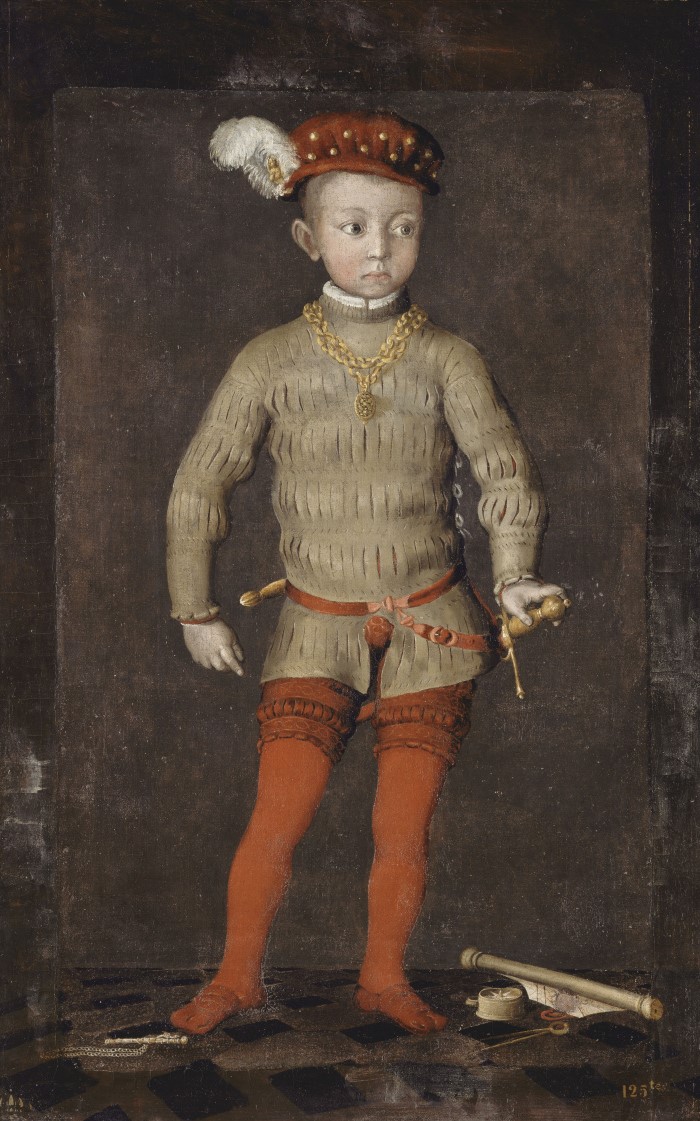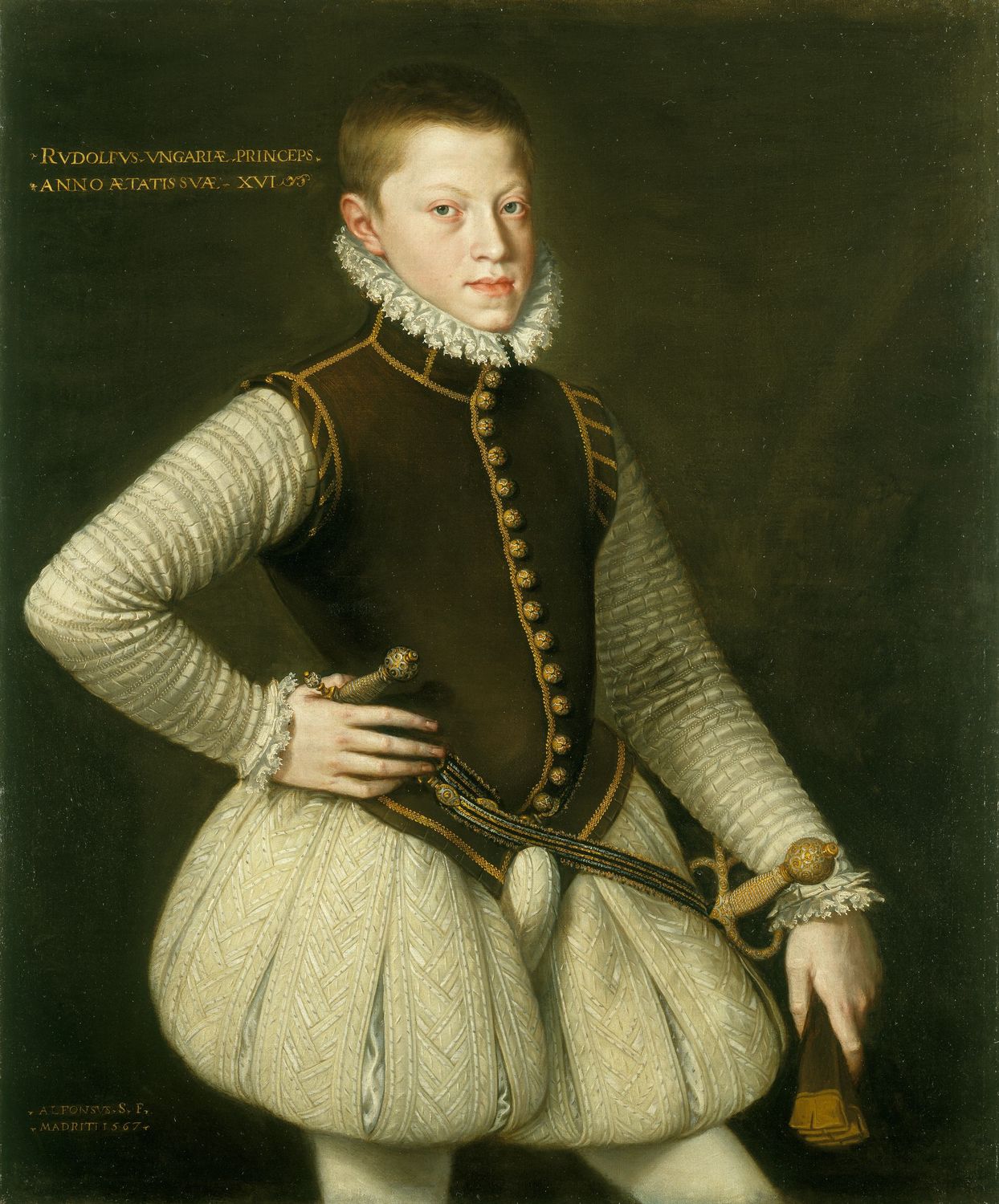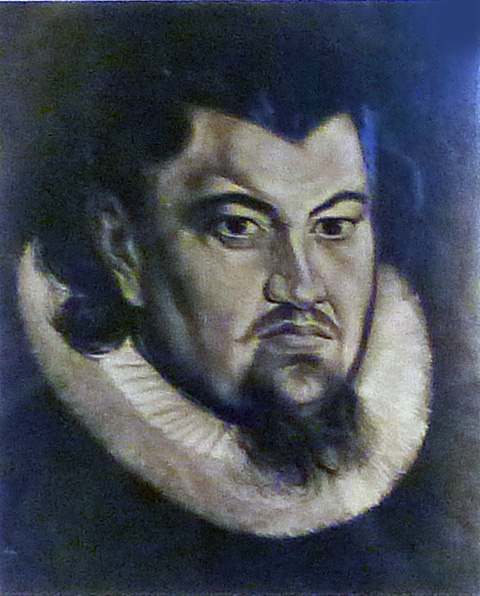|
Christian II Of Saxony
Christian II (23 September 1583 – 23 June 1611) was Elector of Saxony from 1591 to 1611. Early life and background He was born in Dresden, the eldest son of Christian I, Elector of Saxony and Sophie of Brandenburg, the daughter of John George, Elector of Brandenburg. He belonged to the Albertine branch of the House of Wettin. The Albertine Wettins had become enfeoffed with the Saxon electorate in 1547 after Duke Moritz of Saxony backed the emperor in the Schmalkaldic War, siding against his cousin, Elector Johann Friedrich I, of the agnatically senior Ernestine line. Moritz was succeeded in the electorate by his brother August, who remained staunchly Lutheran and a steadfast ally of the emperor, well-aware that the Albertine Wettins owed their status to imperial favour. August established much of Saxony's politically moderate tactics and policies that would be closely followed by Christian II. When August died in 1586, Christian I succeeded him as the Elector of Saxony an ... [...More Info...] [...Related Items...] OR: [Wikipedia] [Google] [Baidu] |
Elector Of Saxony
The Electorate of Saxony, also known as Electoral Saxony ( or ), was a territory of the Holy Roman Empire from 1356 to 1806 initially centred on Wittenberg that came to include areas around the cities of Dresden, Leipzig and Chemnitz. It was a major Holy Roman state, being an Prince-elector, electorate and the original protecting power of Protestant principalities until that role was later taken by its neighbor, Brandenburg-Prussia. In the Golden Bull of 1356, Emperor Charles IV, Holy Roman Emperor, Charles IV designated the Duchy of Saxe-Wittenberg an electorate, a territory whose ruler was one of the prince-electors who chose the Holy Roman emperor. After the extinction of the male Saxe-Wittenberg line of the House of Ascania in 1422, the duchy and the electorate passed to the House of Wettin. The electoral privilege was tied only to the Electoral Circle, specifically the territory of the former Duchy of Saxe-Wittenberg. In the 1485 Treaty of Leipzig, the Wettin noble house w ... [...More Info...] [...Related Items...] OR: [Wikipedia] [Google] [Baidu] |
John Frederick I, Elector Of Saxony
John Frederick I (, 30 June 1503 – 3 March 1554), called the Magnanimous (), was the Elector of Saxony (1532–1547) until he was deprived of this title in the Capitulation of Wittenberg by Charles V, Holy Roman Emperor. He was leading the Schmalkaldic League, a military alliance of Lutheran principalities. Early years John Frederick was the eldest son of John, Elector of Saxony by his first wife, Sophie of Mecklenburg-Schwerin. His mother died fourteen days after his birth, on 12 July 1503. John Frederick received his education from George Spalatin, whom he highly esteemed during his whole life. Spalatin was Martin Luther's friend and advisor and thus, through Spalatin's schooling, John Frederick developed a devotion to the teachings of Luther. His knowledge of history was comprehensive, and his library, which extended over all sciences, was one of the largest in Germany. He cultivated a personal relationship with Luther, beginning to correspond with him in the days when ... [...More Info...] [...Related Items...] OR: [Wikipedia] [Google] [Baidu] |
Christian I, Prince Of Anhalt-Bernburg
Christian I, Prince of Anhalt-Bernburg, also known as Christian of Anhalt, (11 May 1568 – 17 April 1630) was a German prince of the House of Ascania. He was ruling prince of Anhalt and, from 1603, ruling prince of the revived principality of Anhalt-Bernburg. From 1595 he was governor of Upper Palatinate, and soon became the advisor-in-chief of Frederick IV, Elector Palatine. Life Christian was the second son of Joachim Ernest, Prince of Anhalt, by his first wife Agnes, daughter of Wolfgang I, Count of Barby-Mühlingen. Born in Bernburg, Christian was trained from 1570 in Dessau by Caspar Gottschalk in Latin, Italian, and French. Still a child, he participated in diplomatic missions, among other places, to Constantinople; thus prepared, he developed into an ambitious, urbane diplomat. In the early months of 1586 he went to Dresden and remained there several years as the closest friend of his namesake, Christian I, Elector of Saxony, whose Calvinist sympathies he shared. It ... [...More Info...] [...Related Items...] OR: [Wikipedia] [Google] [Baidu] |
Frederick II Of Denmark
Frederick II (1 July 1534 – 4 April 1588) was King of Denmark-Norway, Denmark and Norway and Duke of Duchy of Schleswig, Schleswig and Duchy of Holstein, Holstein from 1559 until his death in 1588. A member of the House of Oldenburg, Frederick began his personal rule of Denmark-Norway at the age of 24. He inherited capable and strong realms, formed in large by Christian III of Denmark, his father after the civil war known as the Count's Feud, after which Denmark-Norway saw a period of economic recovery and of a great increase in the Centralisation, centralised authority of the Crown. Frederick was, especially in his youth and unlike his father, belligerent and adversarial, aroused by honor and national pride, and so he began his reign auspiciously with a campaign under the aged Johan Rantzau, which reconquered Dithmarschen. However, after miscalculating the cost of the Northern Seven Years' War, he pursued a more prudent foreign policy. The remainder of Frederick II's rei ... [...More Info...] [...Related Items...] OR: [Wikipedia] [Google] [Baidu] |
Henri IV Of France
Henry IV (; 13 December 1553 – 14 May 1610), also known by the epithets Good King Henry (''le Bon Roi Henri'') or Henry the Great (''Henri le Grand''), was King of Navarre (as Henry III) from 1572 and King of France from 1589 to 1610. He was the first monarch of France from the House of Bourbon, a cadet branch of the Capetian dynasty. He pragmatically balanced the interests of the Catholic and Protestant parties in France, as well as among the European states. He was assassinated in Paris in 1610 by a Catholic zealot, and was succeeded by his son Louis XIII. Henry was baptised a Catholic but raised as a Huguenot in the Protestant faith by his mother, Queen Jeanne III of Navarre. He inherited the throne of Navarre in 1572 on his mother's death. As a Huguenot, Henry was involved in the French Wars of Religion, barely escaping assassination in the St. Bartholomew's Day massacre. He later led Protestant forces against the French royal army. Henry inherited the throne ... [...More Info...] [...Related Items...] OR: [Wikipedia] [Google] [Baidu] |
Elizabeth I Of England
Elizabeth I (7 September 153324 March 1603) was Queen of England and Ireland from 17 November 1558 until her death in 1603. She was the last and longest reigning monarch of the House of Tudor. Her eventful reign, and its effect on history and culture, gave name to the Elizabethan era. Elizabeth was the only surviving child of Henry VIII and his second wife, Anne Boleyn. When Elizabeth was two years old, her parents' marriage was annulled, her mother was executed, and Elizabeth was declared illegitimate. Henry restored her to the line of succession when she was 10. After Henry's death in 1547, Elizabeth's younger half-brother Edward VI ruled until his own death in 1553, bequeathing the crown to a Protestant cousin, Lady Jane Grey, and ignoring the claims of his two half-sisters, Mary and Elizabeth, despite statutes to the contrary. Edward's will was quickly set aside and the Catholic Mary became queen, deposing Jane. During Mary's reign, Elizabeth was imprisoned fo ... [...More Info...] [...Related Items...] OR: [Wikipedia] [Google] [Baidu] |
Reichshofrat
The Aulic Council (; ; literally "Court Council of the Empire", sometimes abbreviated in academic writing as "RHR") was one of the two supreme courts of the Holy Roman Empire, the other being the ''Reichskammergericht'' (Imperial Chamber Court). Unlike the ''Reichskammergericht'', which was tied to the Imperial estates, the Aulic Council was tied directly to the Emperor. It had not only concurrent jurisdiction with the ''Reichskammergericht'', but in many cases exclusive jurisdiction: the Aulic Council had exclusive jurisdiction in all "feudal" processes, and in criminal affairs, over the immediate subjects of the Emperor and in affairs which concerned the Empire, and more (see '' Responsibilities'' section below). It did not have a single set seat, rather, it was bound with the Emperor's residences. Prague, Wels, and Frankfurt, were all sites of the court, but the most important seat of the Aulic Council was at the Hofburg residence of the Habsburg emperors in Vienna. Since 1 ... [...More Info...] [...Related Items...] OR: [Wikipedia] [Google] [Baidu] |
Rudolf II
Rudolf II (18 July 1552 – 20 January 1612) was Holy Roman Emperor (1576–1612), King of Hungary and Croatia (as Rudolf I, 1572–1608), King of Bohemia (1575–1608/1611) and Archduke of Austria (1576–1608). He was a member of the House of Habsburg. Rudolf's legacy has traditionally been viewed in three ways:Hotson, 1999. an ineffectual ruler whose mistakes led directly to the Thirty Years' War; a great and influential patron of Northern Mannerist art; and an intellectual devotee of occult arts and learning which helped seed what would be called the Scientific Revolution. Determined to unify Christendom, he initiated the Long Turkish War (1593–1606) with the Ottoman Empire. Exhausted by war, his citizens in Hungary revolted in the Bocskai Uprising, which led to more authority being given to his brother Matthias. Under his reign, there was a policy of toleration towards Judaism. Early life Rudolf was born in Vienna on 18 July 1552. He was the eldest son and s ... [...More Info...] [...Related Items...] OR: [Wikipedia] [Google] [Baidu] |
Book Of Concord
''The Book of Concord'' (1580) or ''Concordia'' (often referred to as the ''Lutheran Confessions'') is the historic doctrinal standard recognized as authoritative by many Lutheran church bodies since the 16th century. It consists of ten creedal documents and is also known as the symbolical book of the Evangelical Lutheran Church. ''The Book of Concord'' was published in German on June 25, 1580, in Dresden, the fiftieth anniversary of the presentation of the '' Augsburg Confession'' to Emperor Charles V at the Diet of Augsburg. The authoritative Latin edition was published in 1584 in Leipzig. Those who accept it as their doctrinal standard recognize it to be a faithful exposition of the Bible. The Holy Scriptures are set forth in ''The Book of Concord'' to be the sole, divine source and norm of all Christian doctrine. Origin and arrangement ''The Book of Concord'' was compiled by a group of theologians led by Jakob Andreae and Martin Chemnitz at the behest of their ruler ... [...More Info...] [...Related Items...] OR: [Wikipedia] [Google] [Baidu] |
Crypto-Calvinists
Crypto-Calvinism is a pejorative term describing a segment of those members of the Lutheran Church in Germany who were accused of secretly subscribing to Calvinist doctrine of the Eucharist in the decades immediately after the death of Martin Luther in 1546. It denotes what was seen as a hidden (''crypto''- from meaning "to hide, conceal, to be hid") Calvinist belief, i.e., the doctrines of John Calvin, by members of the Lutheran Church. The term crypto-Calvinist in Lutheranism was preceded by terms Zwinglian and Sacramentarian. Also, Jansenism has been accused of crypto-Calvinism by Roman Catholics. Background Martin Luther had controversies with " Sacramentarians", and he published against them, for example, in his '' The Sacrament of the Body and Blood of Christ—Against the Fanatics'' and '' Confession Concerning Christ's Supper''. Philipp I of Hessen arranged the Marburg Colloquy in 1529, but no agreement could be reached concerning the doctrine of Real Presence. ... [...More Info...] [...Related Items...] OR: [Wikipedia] [Google] [Baidu] |
Friedrich Wilhelm I, Duke Of Saxe-Weimar
Friedrich Wilhelm I (25 April 1562 in Weimar – 7 July 1602 in Weimar) was a duke of Saxe-Weimar. He was the eldest son of Johann Wilhelm, Duke of Saxe-Weimar and Dorothea Susanne of Simmern. Life At the time of the death of his father (1573), Friedrich Wilhelm was still under age; for this, a tutelary government for the duchy was appointed. The Dowager Duchess, Dorothea Susanne, could however not prevent the Elector Augustus of Saxony – from the Albertine line – from being designated as the regent in her place. In 1586, Friedrich Wilhelm was declared an adult and began his independent government over in Saxe-Weimar. Five years later, in 1591, the Elector Christian I of Saxony died and was succeeded by his eldest son Christian II. Because the new Elector was still under age, the regency of the Electorate was assigned to Sophie of Brandenburg, widow of Christian I and mother of the heir. While she became regent, Friedrich Wilhelm was asked to assist and given the ... [...More Info...] [...Related Items...] OR: [Wikipedia] [Google] [Baidu] |
Nikolaus Krell
Nikolaus Krell (c. 1551 – 9 October 1601), chancellor of the elector of Saxony, was born at Leipzig, and educated at the university of his native town. About 1580 he entered the service of Christian I, the eldest son of Augustus I, elector of Saxony, and when Christian succeeded his father as elector in 1586, became his most influential counselor. Krell's religious views were Calvinistic or Crypto-Calvinistic, and both before and after his appointment as chancellor in 1589 he sought to advance his own religious views at the expense of the reigning Lutheran Orthodoxy which was the sanctioned religion of Electorate of Saxony. Calvinists were appointed to many important ecclesiastical and educational offices; a translation of the Bible with Calvinistic annotations was published; and Krell took other measures to attain his end. In foreign politics, also, he sought to change the traditional policy of Saxony of close collaboration with the Habsburg emperors, acting in unison wit ... [...More Info...] [...Related Items...] OR: [Wikipedia] [Google] [Baidu] |





